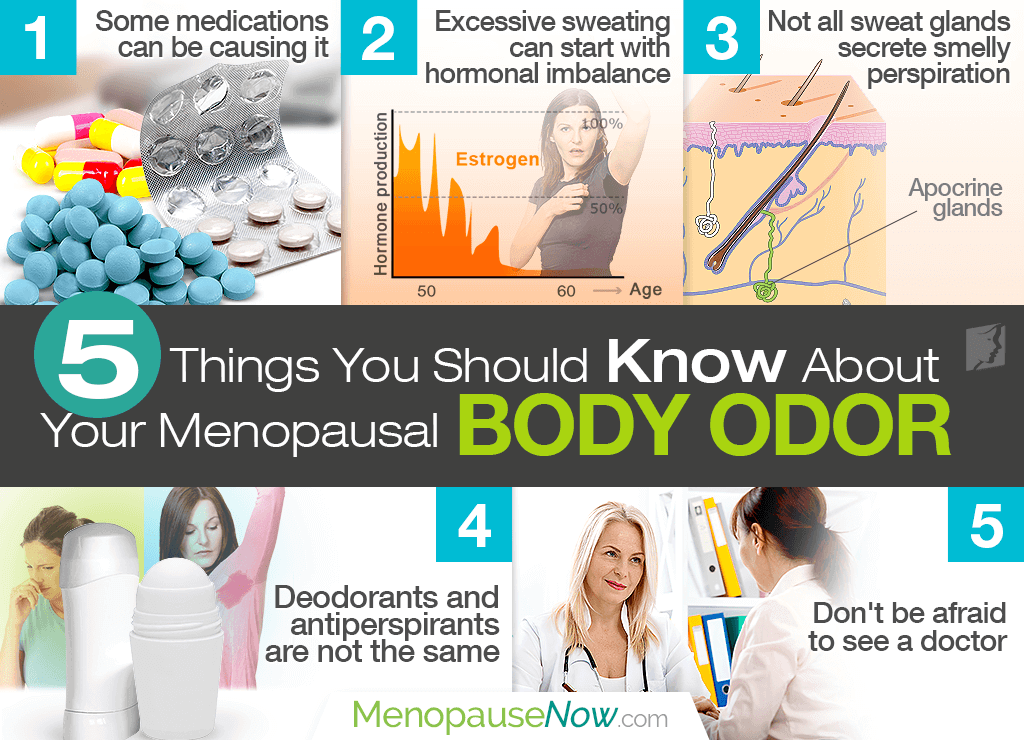Many women voice concerns about increases and changes in body odor and sweating when they enter the menopausal transition. However, many also find that their menopause body odor is not connected to other symptoms that could lead to excessive perspiration, such as hot flashes, night sweats, and anxiety.
Keep reading to find out five things you should know about menopausal body odor to finally stop feeling self-conscious about your personal scent.
Some medications can be causing it
Taking medications such as acetaminophen or antidepressants can cause intense perspiration or make perimenopausal body odor worse. Talk to your doctor if you think your medications might be exacerbating your unfresh scent.
Excessive sweating can start with hormonal imbalance
The brain's hypothalamus gland, which is located at the base of the brain, controls body temperature and is partially regulated by estrogen, one of the main female hormones. As estrogen levels decrease during menopause, the hypothalamus has trouble regulating temperature, and this can lead to hot flashes, night sweats, and other vasomotor systems leading to excessive perspiration.
Not all sweat glands secrete smelly perspiration
There are two types of sweat glands: eccrine and apocrine. Eccrine sweat glands are found all over the body and secrete a non-smelly sweat used to cool down the body. On the other hand, apocrine sweat glands are located in your armpits, groin area, and other places close to large hair follicles. They release sweat when a person experiences emotional stress that contains fatty composites. Bacteria feed on the fatty composites when the sweat reaches the skin's surface and then release an odor, causing body odor.
Deodorants and antiperspirants are not the same
Deodorants are meant to get rid of odor, but they do not decrease body perspiration. Deodorants are usually alcohol-based and work by creating an acidic environment on the skin that is inhospitable to the bacteria that feed on sweat and make it smell bad. They also often contain perfumes or scents meant to mask smells.
On the other hand, antiperspirants contain aluminum compounds that clog pores so that sweat cannot escape onto your skin. They cause a person to sweat less. Stronger antiperspirants are available with a prescription from a doctor.
Don't be afraid to see a doctor
Perspiration and menopausal body odor can be embarrassing and uncomfortable to talk about. However, this should not stop you from seeking medical help if they are lowering your quality of life. Know that there are various menopausal body odor treatments that can help you fight the unpleasant scent, like eliminating certain foods and products - such as alcohol, red meat, coffee, garlic, and cigarettes - from your lifestyle that can increase perspiration or body odor.
You don't have to suffer from menopausal body odor for much longer. Take these considerations to mind to be rid of the stink once and for all.
Sources
- Mayo Clinic. (2017). Sweating and body odor: Symptoms & causes | Diagnosis & treatment | Acetaminophen (Oral Route, Rectal Route). Retrieved November 16, 2018, from https://www.mayoclinic.org/diseases-conditions/sweating-and-body-odor/symptoms-causes/syc-20353895 | https://www.mayoclinic.org/diseases-conditions/sweating-and-body-odor/diagnosis-treatment/drc-20353898 | https://www.mayoclinic.org/drugs-supplements/acetaminophen-oral-route-rectal-route/side-effects/drg-20068480
- NHS. (2016). Body odour. Retrieved November 16, 2018, from https://www.nhs.uk/conditions/body-odour/


